What is Sales Coaching?

Sales coaching helps sales reps improve their skills and close more deals. Sales coaching can make a big difference in how well a sales team performs.
Sales coaching is important because it helps sales reps get better at their jobs. When sales reps improve, they can sell more products and make customers happier. The coaching process must be iterative and responsive, adapting to the evolving needs of the sales team to maximize performance.
A dynamic sales coaching platform not only structures self coaching, but also scales up the coaching efforts across geographically dispersed teams.
For example, a study from CSO Insights found that companies with good sales coaching programs see a 17% higher customer and win rate. This means more sales and more money for the coach and company in revenue side.
10 Sales Coaching Software and Tools
Implementing robust sales coaching software can streamline the coaching process, ensuring consistent and measurable improvements across the team.
1. Gong: Real-Time Call Coaching

Gong is a popular sales coaching tool. It helps sales teams by recording and analyzing sales calls. Gong gives sales reps real-time feedback during calls.
Gong uses artificial intelligence to analyze conversations. It can detect patterns in successful sales calls. This helps sales teams understand what works best.
Key Features:
- Real-Time Feedback: Gong provides tips during calls.
- Call Recording: It records all sales calls for review.
- Analysis: It analyzes calls to find areas for improvement.
G2 Rating: 4.7 out of 5
2. Chorus: In-Depth Call Analysis
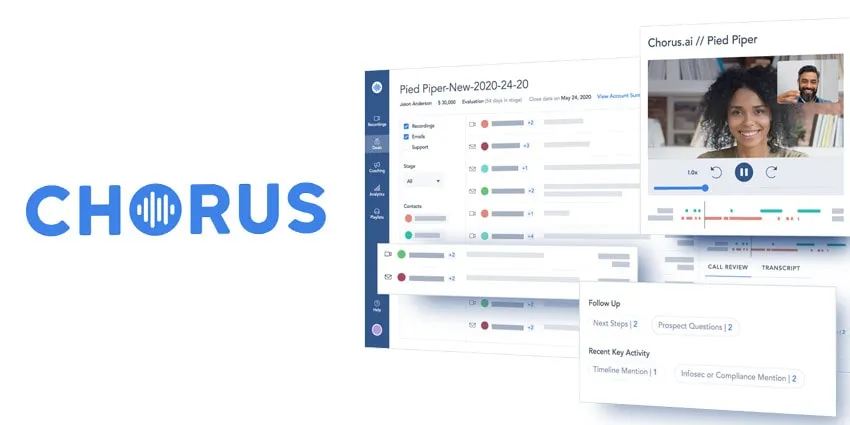
Chorus is another great sales coaching software. It helps sales coaches and teams by giving detailed feedback on sales calls. This helps sales reps improve their skills and close more deals.
Chorus can track the sales cycle. It shows how long each stage takes. This helps sales managers identify bottlenecks and improve the sales process.
Key Features:
- Call Analysis: Chorus breaks down calls to show what works and what doesn’t.
- Team Collaboration: Sales reps can share calls and tips with the team.
- Coachable Moments: It highlights key moments in calls for training.
G2 Rating: 4.6 out of 5
3. SalesLoft: Comprehensive Sales Coaching Platform
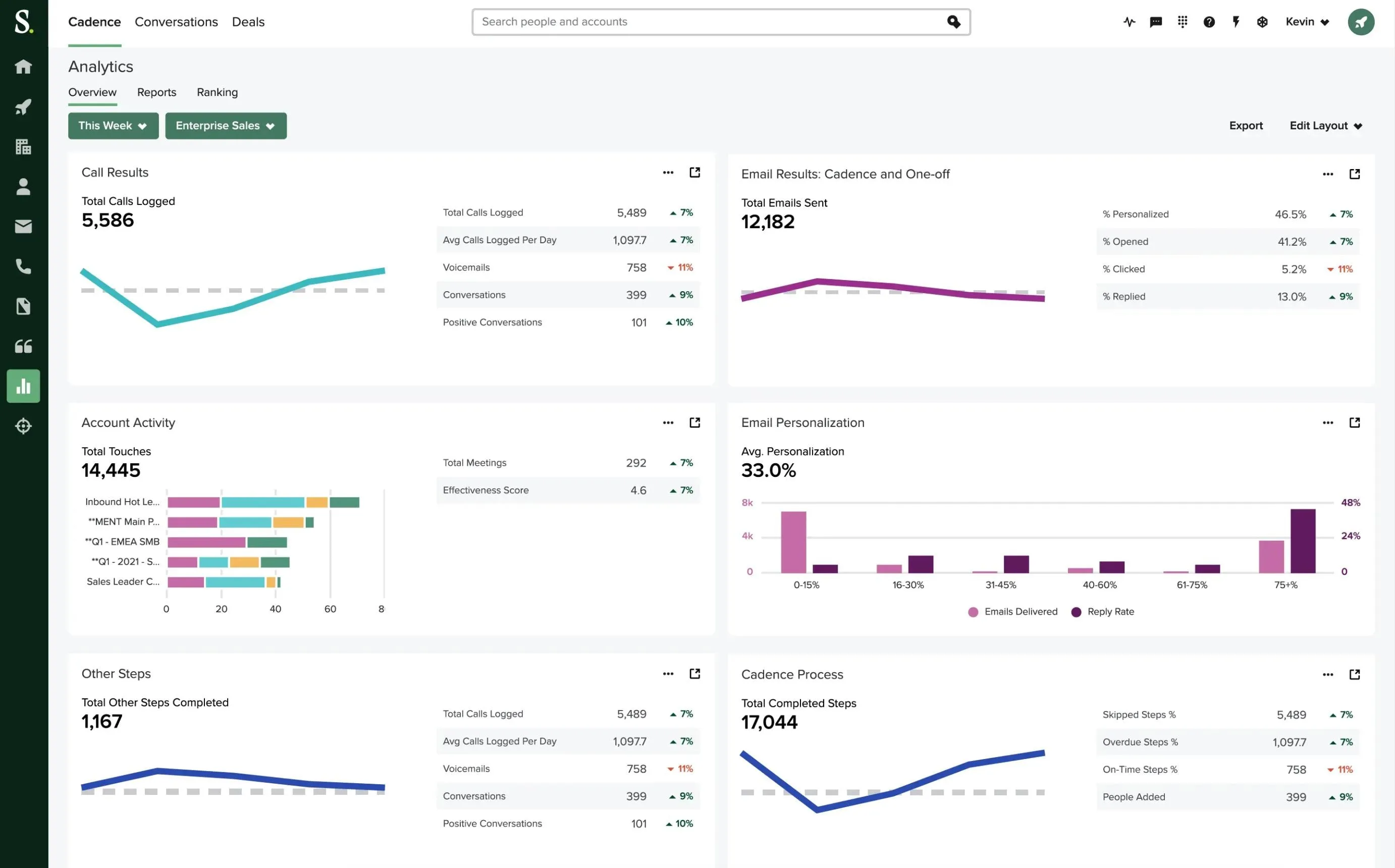
SalesLoft helps sales organizations and teams manage their sales process. It offers tools for tracking progress and for coaching opportunities for sales reps.
SalesLoft integrates with other sales tools like Salesforce. This makes it easy to access and keep all your sales data in one place.
Key Features:
- Sales Process Tracking: Keep track of where each deal is in the sales cycle.
- Email Tracking: See when customers open emails.
- Call Coaching: Get feedback on sales calls.
G2 Rating: 4.5 out of 5
4. Outreach.io: Streamlining Sales Reps Activities
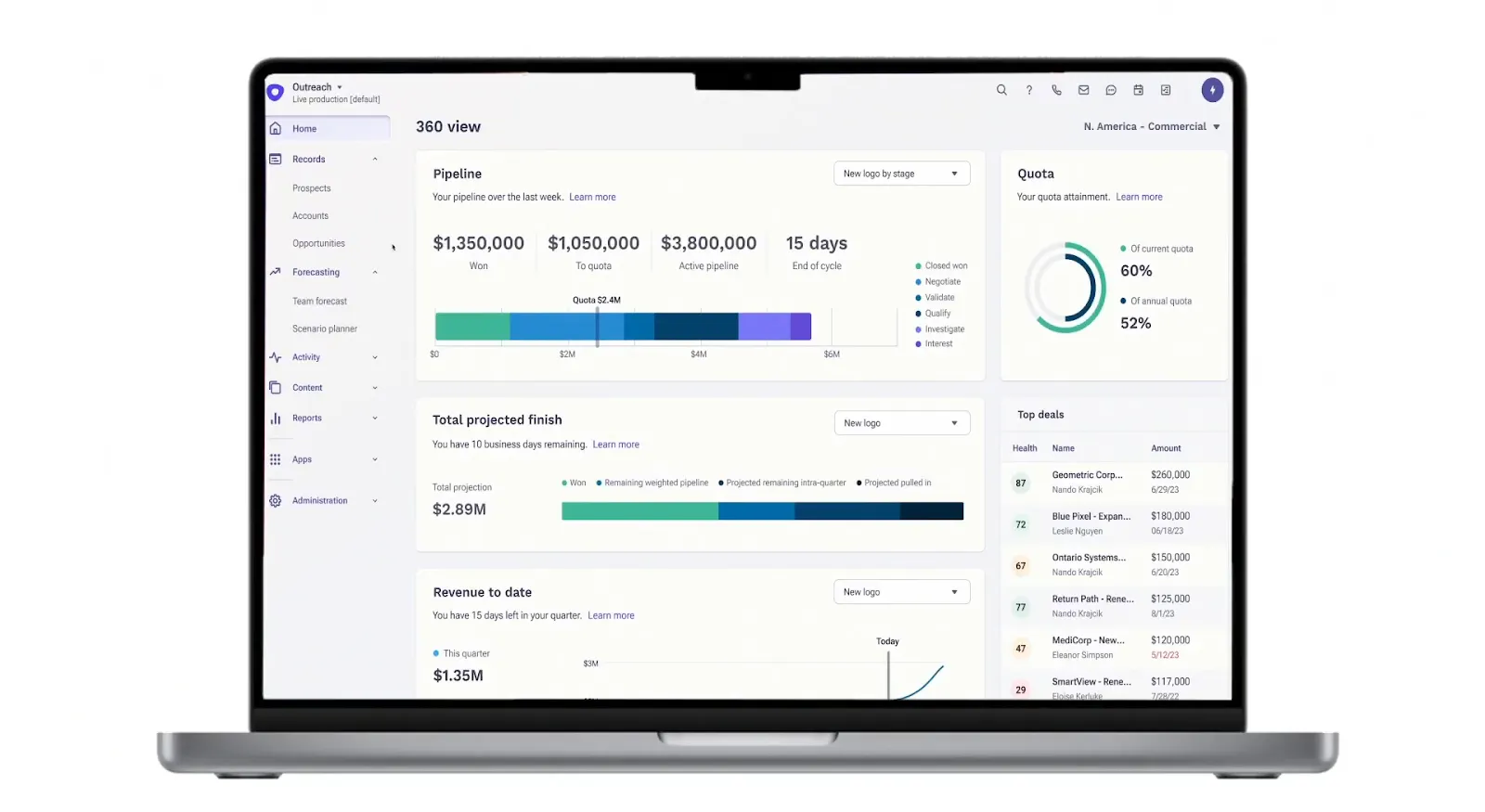
Outreach.io helps automate parts of the sales process. It also offers tools for sales coaching. Outreach uses machine learning to predict which leads are most likely to convert. This helps sales reps focus on the best opportunities.
Key Features:
- Email Automation: Send follow-up emails automatically.
- Call Coaching: Get tips on improving sales calls.
- Performance Tracking: See how well your sales team is doing.
G2 Rating: 4.3 out of 5
5. MindTickle: Sales Readiness and Training
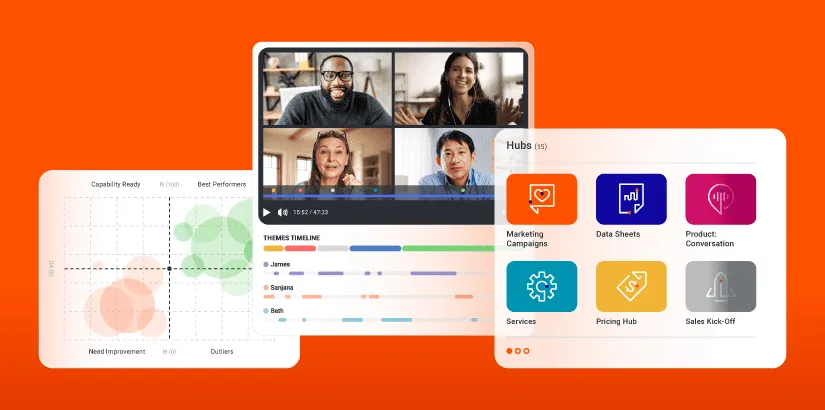
MindTickle focuses on making sure sales reps are ready to sell. It offers training and coaching tools. MindTickle has a gamification feature. This makes learning fun by turning training into a game. Sales reps can earn points and badges for completing modules.
Key Features:
- Training Modules: Learn new skills with interactive lessons.
- Quizzes: Test your knowledge after training.
- Feedback: Get feedback on your performance.
G2 Rating: 4.7 out of 5
6. Refract: Detailed Call Coaching

Refract helps sales teams by analyzing calls and video meetings. It highlights key moments for coaching.
Refract can analyze customer body language in video meetings. This ability helps sales reps understand how their non-verbal cues affect the conversation.
Key Features:
- Call Analysis: Shows what works and what doesn’t.
- Video Analysis: Analyzes video meetings for training.
- Coaching Tips: Provides tips based on analysis.
G2 Rating: 4.6 out of 5
7. Lessonly: Sales Training Software
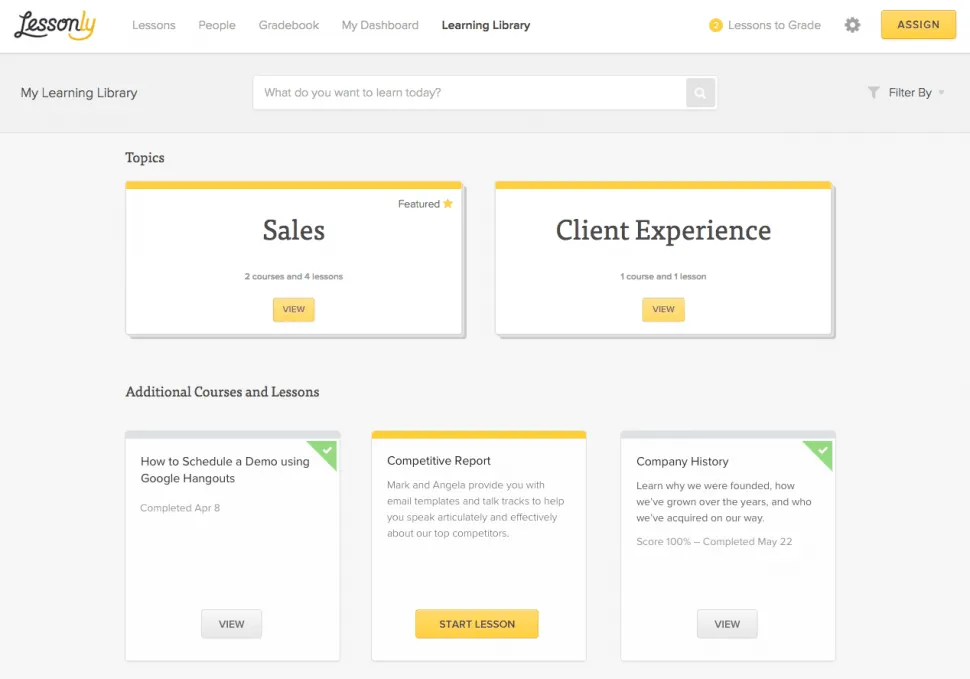
Lessonly is a tool that helps sales teams with training. It makes learning easy and fun. Lessonly allows sales managers to create custom lessons. This means you can tailor the training to fit your team's needs perfectly.
Key Features:
- Interactive Lessons: Sales reps can learn new skills with fun lessons.
- Practice Mode: Reps can practice what they learned.
- Track Progress: Managers can see how well reps are doing.
G2 Rating: 4.6 out of 5
8. Ambition: Sales Performance Management
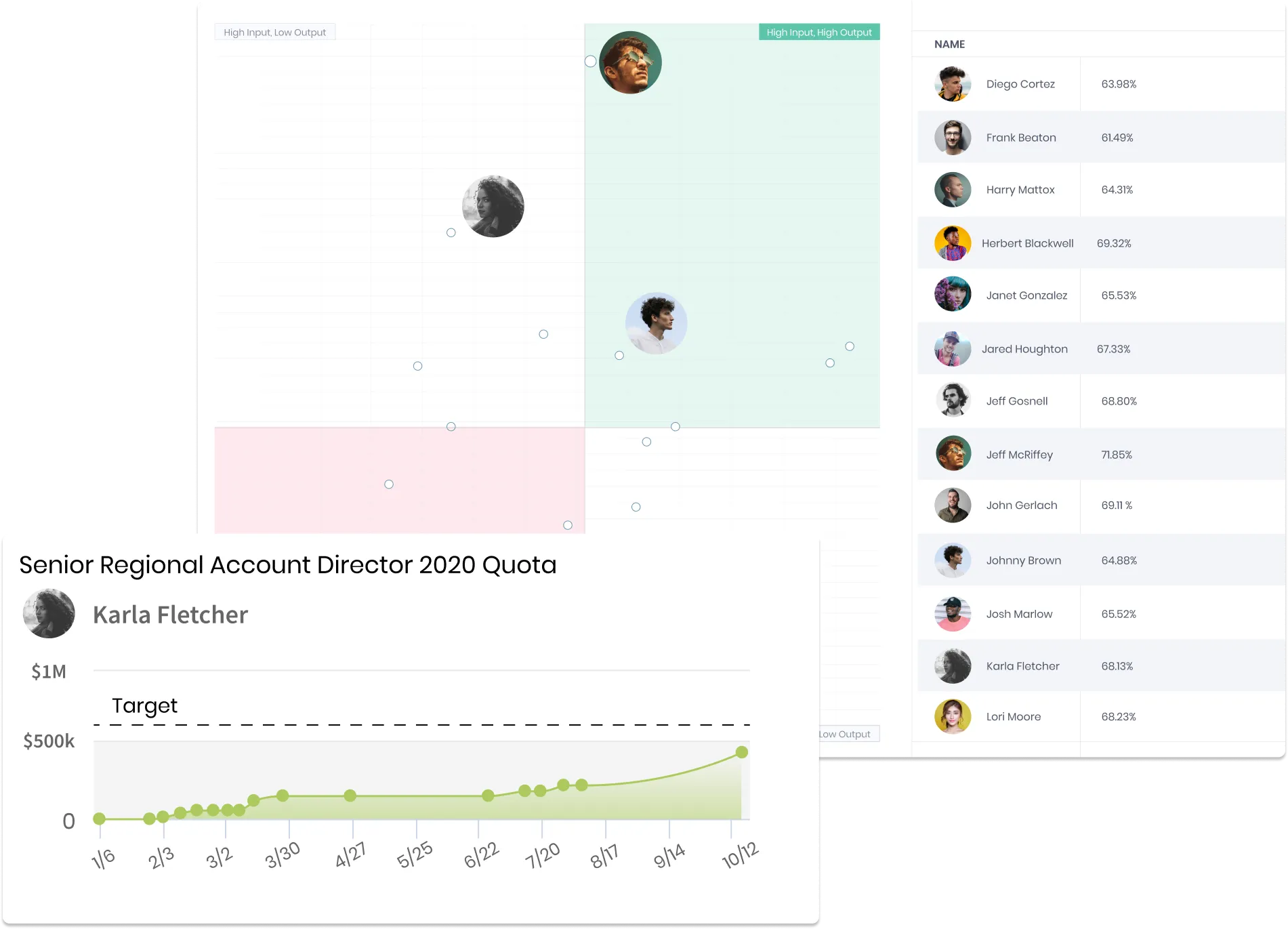
Ambition helps sales teams by keeping track of their performance. It uses games and contests to make work fun.
Ambition integrates with Slack. This makes it easy to keep the team engaged and motivated with real-time updates and notifications.
Key Features:
- Leaderboards: See who is doing the best on your team.
- Contests: Sales reps can join fun contests to win prizes.
- Coaching Tools: Managers can track progress and provide feedback.
G2 Rating: 4.5 out of 5
9. Brainshark: Sales Enablement and Readiness
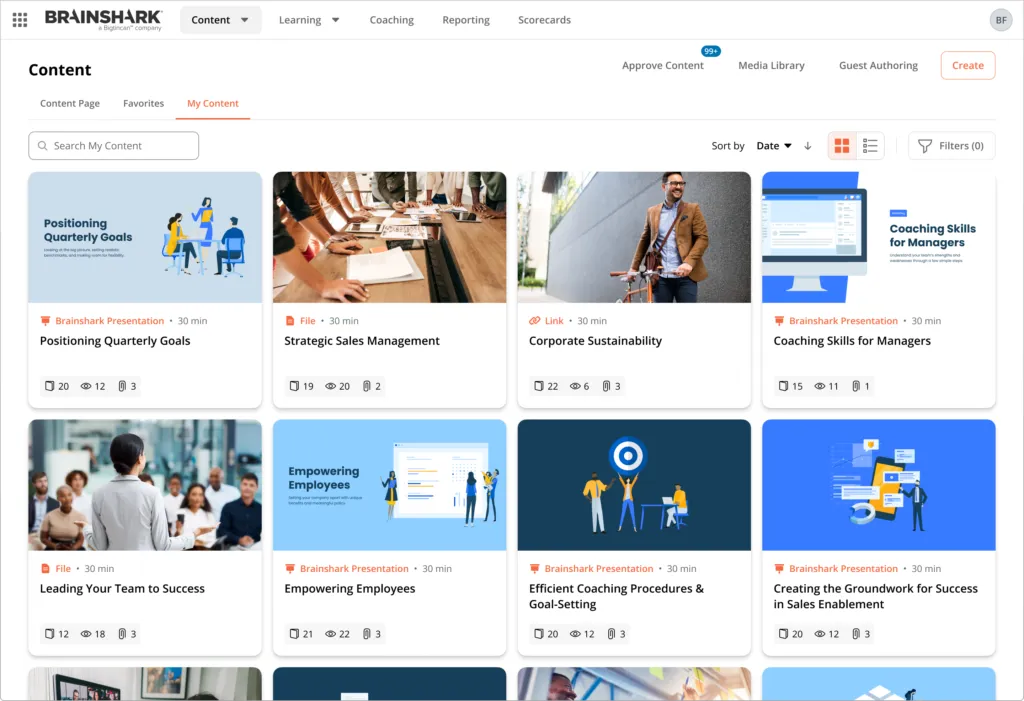
Brainshark helps sales reps be ready to sell. It offers training and coaching tools. Brainshark provides a detailed report and analytics on training performance. This helps sales managers understand what training is most effective and where reps need more help.
Key Features:
- Training Videos: Sales reps can learn new skills with videos.
- Quizzes: Test what you learned with quizzes.
- Feedback: Get feedback on how you are doing.
G2 Rating: 4.4 out of 5
10. ExecVision: Call Coaching and Analysis
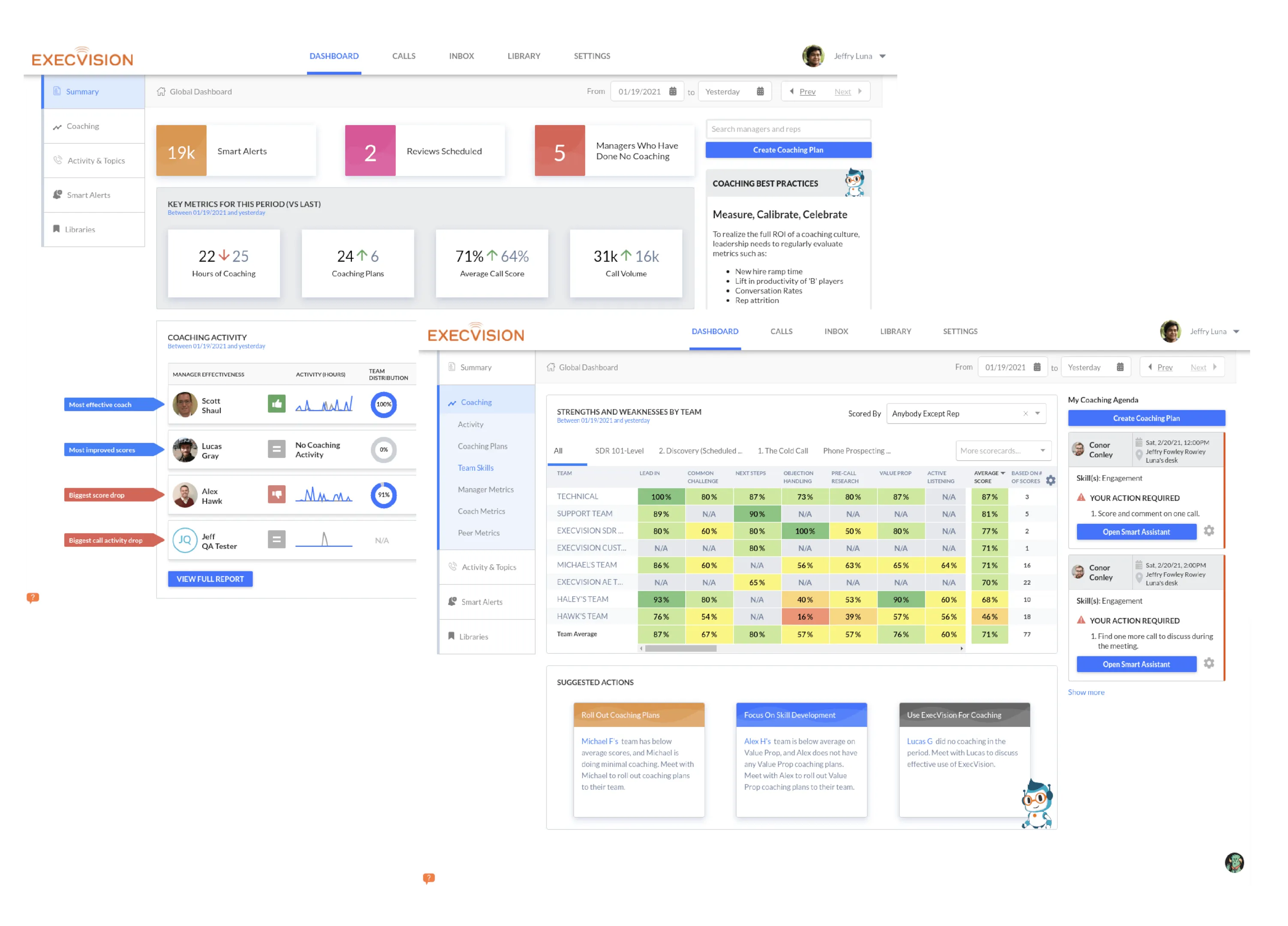
ExecVision helps sales teams improve their calls. It gives detailed feedback on sales calls. ExecVision uses voice recognition technology to transcribe calls. This makes it easy to search for specific keywords or phrases and see how they impact sales success.
Key Features:
- Call Analysis: Breaks down calls to show what can be better.
- Feedback: Provides detailed feedback on calls.
- Training: Offers training based on call performance.
G2 Rating: 4.4 out of 5
How to Use Sales Coaching for Sales Process?

1. Define and Clarify Goals
Setting clear goals is the first step. Sales managers should work with sales reps to set specific, achievable targets. These targets should be clear so everyone knows what they need to do.
Why It's Important:
- Direction: Clear goals give sales reps direction.
- Motivation: Goals motivate sales teams to work harder.
- Measurement: Goals help measure progress.
How to Do It:
SMART Goals: Make sure goals are Specific, Measurable, Achievable, Relevant, and Time-bound.
Regular Check-ins: Have regular meetings to discuss goals and progress.
Adjust as Needed: Be ready to change goals if needed.
2. Schedule Consistent Training Programs
Regular training helps sales leaders and teams learn new skills and stay sharp. Training can be done in person or through sales coaching tools and software. A comprehensive coaching program benefits the entire team, elevating overall sales performance and morale.
Why It's Important:
- Skill Improvement: Training helps sales reps improve their skills.
- Knowledge Update: Keeps sales teams updated on new products and market trends.
- Confidence Building: Makes sales reps more confident in their abilities.
How to Do It:
Weekly Sessions: Schedule training sessions every week.
Use Tools: Use sales coaching tools and software for training.
Interactive Learning: Include role-playing and interactive lessons.
3. Provide Individualized Feedback
Every sales rep is different. Giving personalized feedback helps each rep improve where they need it most. It's crucial for managers to leave targeted feedback after observing sales and customer interactions well, as it provides direct, actionable advice for reps
Why It's Important:
- Personal Growth: Helps each sales rep grow individually.
- Targeted Improvement: Focuses on specific areas that need improvement.
- Boosts Morale: Shows reps that managers care about their development.
How to Do It:
One-on-One Meetings: Have regular one-on-one meetings with each sales rep.
Detailed Reports: Provide detailed reports on their performance.
Actionable Insights: Give specific and clear understanding on actionable tips and valuable insights that can be used for improvement.
4. Build a Team-Oriented Culture
Creating a team-oriented culture means encouraging everyone to work together. Sales reps should help each other and share tips.
Why It's Important:
- Collaboration: Working together helps solve problems faster.
- Support: Team members can support each other.
- Motivation: A friendly environment keeps everyone motivated.
How to Do It:
Team Meetings: Hold regular team meetings to discuss goals and challenges.
Sharing Successes: Celebrate team successes together.
Mentorship: Pair new hires with experienced reps and industry, for guidance.
5. Utilize Sales Performance Metrics
Sales managers use performance metrics to evaluate the effectiveness of their sales reps. These numbers provide insights into each rep's performance. The metrics also help identify areas where improvements are necessary.
Why It's Important:
- Measurement: Metrics help measure progress.
- Improvement: They show where sales reps need to improve.
- Transparency: Everyone knows how they are performing.
How to Do It:
Track Sales Calls: Keep a record of all sales calls.
Monitor Conversion Rates: Check how many calls turn into sales.
Use Software: Use sales coaching software to track these important metrics easily.
6. Encourage Continuous Learning
Continuous learning means always trying to learn new things. Sales reps should always look for ways to improve their skills.
Why It's Important:
- Skill Improvement: Learning new things helps improve skills.
- Adaptability: Keeps sales reps ready for changes in the market.
- Confidence: Knowledge improves confidence in sales reps.
How to Do It:
Provide Training: Offer regular training sessions on new sales techniques.
Share Resources: Share books, articles, and videos about sales.
Promote Self-Study: Encourage sales reps to study on their own.
7. Offer On-the-Spot Assistance
Providing them access and ability to immediate help can make a big difference. When sales reps have questions, giving quick answers keeps them on track.
Why It's Important:
- Instant Support: Helps sales reps solve problems right away.
- Confidence Boost: Sales reps feel more supported.
- Improved Performance: Quick help can lead to better results.
How to Do It:
Use Chat Tools: Use instant messaging for quick questions.
Have Open Office Hours: Let sales managers be available at certain times.
Encourage Team Support: Sales teams should help each other with quick tips.
8. Recognize and Reward Achievements
Celebrating success keeps sales reps motivated. Recognizing their hard work shows sales professionals that you value their efforts.
Why It's Important:
- Motivation: Rewards encourage sales reps to work harder.
- Positive Environment: Celebrations create a happy workplace.
- Retention: Sales reps are more likely to stay when they feel appreciated.
How to Do It:
Give Awards: Offer awards for top performers.
Celebrate Milestones: Celebrate when goals are reached.
Offer Incentives: Give bonuses or extra time off as rewards.
9. Develop a Structured Coaching Program
A structured program ensures consistent coaching. It helps sales reps know what to expect and when.
Why It's Important:
- Consistency: Regular coaching helps steady improvement.
- Clear Expectations: Sales reps know what they need to do.
- Better Results: A structured approach leads to better performance.
How to Do It:
Create a Schedule: Plan regular coaching sessions.
Set Clear Goals: Have specific goals for success and achieve them in each session.
Track Progress: Use sales coaching software to monitor improvement.
10. Encourage Self-Assessment
Self-assessment helps sales reps take charge of their own growth. It makes them more aware of their strengths and weaknesses.
Why It's Important:
- Personal Growth: Sales reps learn to improve on their own.
- Accountability: Sales reps take responsibility for their development.
- Continuous Improvement: Regular self-checks lead to ongoing progress.
How to Do It:
Provide Tools: Give sales reps tools for self-assessment.
Set Regular Times: Encourage them to self-assess regularly.
Offer Guidance: Help them understand how to use self-assessment results.
Conclusion
Sales coaching is a powerful tool that can help your organization and sales team improve and succeed. By using sales coaching software, using practices, setting clear goals, and providing regular feedback, you can make your sales process more effective.
Sales on coach helps sales reps learn and grow. It offers real-time feedback and training, which makes a big difference in their performance. Sales managers can track progress and adjust strategies to meet targets.
Leverage advanced sales coaching tools to foster a more dynamic learning environment and accelerate the development of your sales reps.
The key to successful sales coaching is consistency and support. Keep encouraging your sales coach and team, recognize their achievements, and help them continuously learn and improve. By doing so, you'll see better results and a more motivated team.





.jpg)

.jpg)
